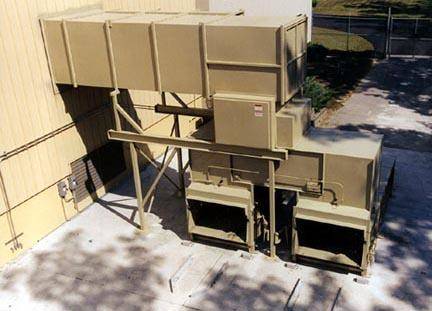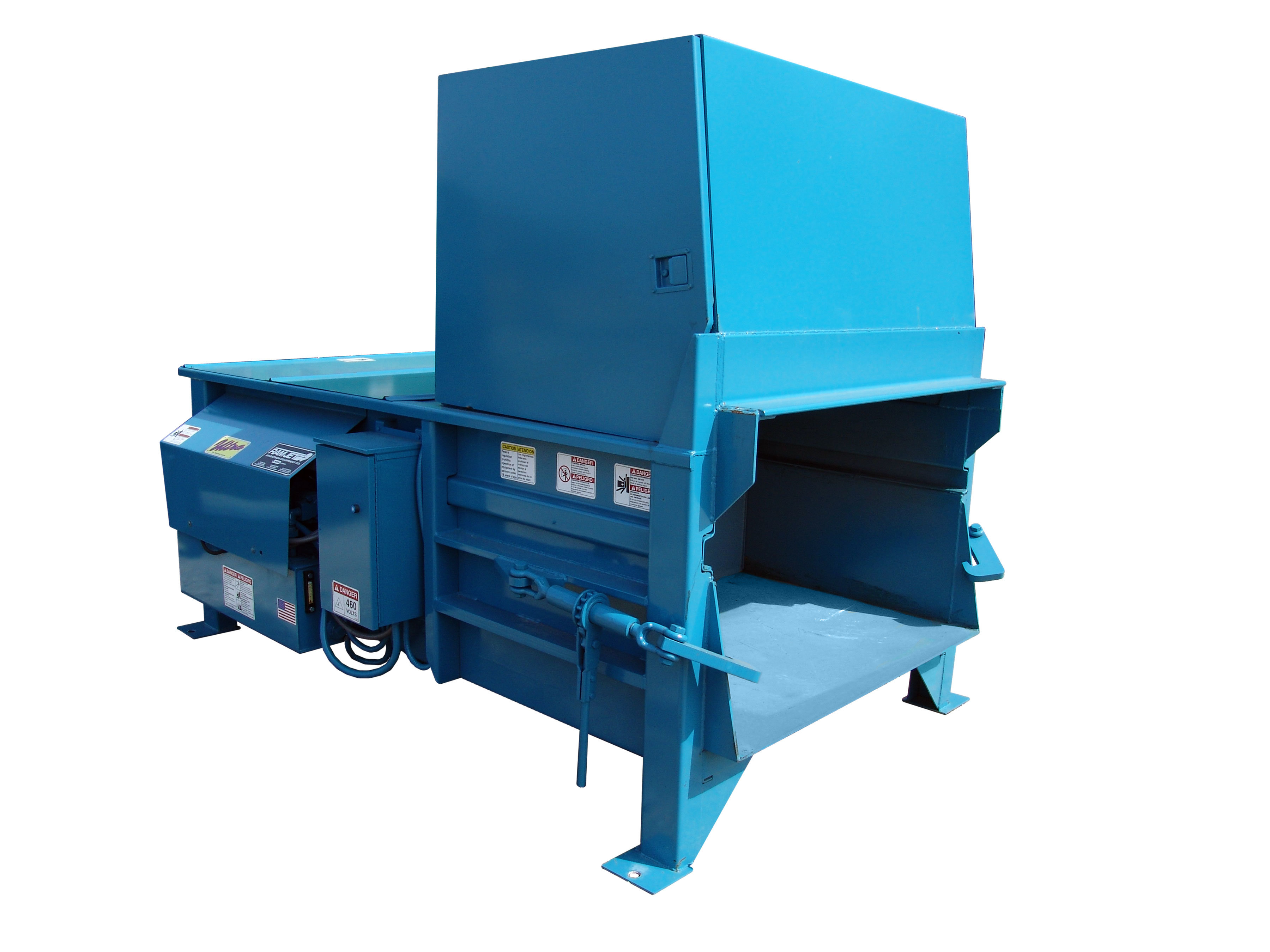The role of Commercial trash compactor equipment in environmentally friendly waste strategies
Wiki Article
The Function of Waste Equipment in Supporting Sustainable Garbage Disposal Practices
Waste Equipment serves a fundamental duty in advancing lasting garbage disposal practices. It encompasses a variety of devices made to improve the effectiveness of waste collection, partition, and handling. By using Equipment such as compactors, shredders, and recycling containers, communities can substantially minimize their reliance on land fills. Nevertheless, the impact of these devices extends past performance. Understanding their more comprehensive ramifications discloses understandings right into how they shape environmental obligation and community interaction. What lies ahead in this evolving landscape?Comprehending Waste Equipment and Its Relevance
Waste Equipment plays a crucial role in effective waste administration systems. It incorporates an array of tools and equipment made to deal with, process, and get rid of waste materials efficiently. Comprehending waste Equipment is essential for communities, businesses, and organizations aiming to apply lasting waste disposal techniques - Commercial garbage compaction equipment. Appropriately working waste Equipment not only streamlines the collection and transport of waste yet also lessens ecological impact by making certain that waste is managed sensiblyThe relevance of waste Equipment extends to enhancing reusing efforts, decreasing garbage dump usage, and advertising source recovery. Equipment such as shredders, balers, and compactors promote the processing of waste, making it much easier to divide recyclable products from general refuse. Furthermore, developments in waste technology add to the advancement of more eco-friendly options, thus strengthening the dedication to sustainability. In general, waste Equipment functions as a cornerstone for reliable waste management, cultivating a cleaner and much healthier atmosphere for future generations.
Sorts Of Waste Equipment for Effective Waste Management
Reliable waste administration counts on different kinds of Equipment designed to resolve details disposal requirements. Among these, compactors play an important function by minimizing the quantity of waste, making transport more efficient. Shredders are crucial for breaking down huge things, facilitating easier handling and disposal. Additionally, balers press recyclable materials into manageable bales, optimizing storage and transport.Containers and bins are essential for collecting waste at the resource, ensuring appropriate partition and minimizing contamination. For dangerous products, specialized Equipment, such as drum crushers and watertight containers, is necessary to ensure safety and security and compliance with policies.
Transportation automobiles furnished with hydraulic systems boost the performance of waste collection and disposal processes. Each kind of waste Equipment adds to a streamlined waste management system, promoting sustainability and lowering environmental impact via effective disposal techniques.
The Function of Reusing Bins in Sustainable Practices
Recycling bins play an essential duty in advertising lasting methods by assisting in reliable waste separation. By offering marked containers for recyclable materials, they encourage people to embrace environment-friendly habits. This simple execution substantially contributes to decreasing land fill waste and boosting recycling rates.Efficient Waste Splitting Up
Proper waste splitting up plays a critical function in advertising sustainable methods, and reusing bins serve as a significant device in this process. By plainly identifying between recyclables, compostables, and general waste, these bins assist in effective sorting, lessening contamination and maximizing recycling performance. Their tactical placement in private and public spaces urges people to take part in accountable waste disposal. In addition, using color-coded containers aids to streamline the splitting up procedure, making it intuitive for customers. This organizational technique not just improves reusing rates but additionally increases awareness regarding the relevance of waste monitoring. Essentially, recycling containers are fundamental elements that sustain effective waste splitting up, inevitably contributing to a more sustainable setting and decreasing the general pressure on landfills.Urging Eco-Friendly Actions
Individuals might be inclined to overlook their impact on the setting, the visibility of reusing containers substantially affects environment-friendly habits. These bins function as aesthetic suggestions, motivating people to separate recyclables from general waste. Their calculated placement in public rooms promotes accessibility, making it easier for people to adopt sustainable practices. Research studies indicate that when reusing containers are available, recycling prices increase significantly, showing a straight connection between framework and actions. Furthermore, vivid signage on these bins enlightens users regarding what materials can be recycled, minimizing contamination prices. By promoting a culture of recycling, these containers not just help with correct waste administration however likewise influence a collective responsibility toward ecological stewardship, ultimately adding to an extra sustainable future.Composting Equipments: Turning Waste Into Resources
Composting systems function as an essential device in changing organic waste right into valuable resources, supplying various environmental benefits. Numerous sorts of composting Equipment deal with different demands, making the procedure easily accessible to both areas and individuals. Comprehending the composting process is necessary for maximizing its effectiveness and promoting lasting waste administration practices.Benefits of Composting Equipments
Numerous neighborhoods are significantly identifying the countless benefits of composting systems, which change natural waste right into useful resources. These systems effectively minimize land fill waste, thereby reducing greenhouse gas discharges and conserving natural deposits. By converting food scraps, lawn waste, and other natural materials into nutrient-rich compost, they boost dirt health and fertility, advertising lasting farming practices. Composting aids to maintain wetness in the soil, minimizing the demand for chemical fertilizers and watering. It cultivates biodiversity by providing a habitat for beneficial microbes and bugs. Furthermore, composting educates individuals regarding environmental stewardship, urging a society of sustainability. On the whole, composting systems play a crucial role in developing a circular economic climate, where waste is reduced, and sources are recycled.Kinds Of Composting Equipment
A variety of composting Equipment is available to promote the effective handling of organic waste right into useful garden compost. These systems vary from simple yard garden compost containers to advanced commercial composters. For home usage, tumblers and static containers are prominent, enabling manageable aeration and blending. Aerated static piles utilize blowers to boost air flow, greatly speeding up decay. Large-scale operations might utilize in-vessel composters, which control temperature level and humidity for optimal composting conditions. Worm composters, or vermicomposting systems, harness the natural digestion procedures of worms to break down natural issue. In addition, shredders and chippers assist prepare materials by minimizing size, promoting faster breakdown. Each kind of Equipment serves particular requirements, making it possible for diverse composting methods that add to lasting waste monitoring.Composting Process Explained
The composting procedure transforms organic waste into nutrient-rich resources with a series of chemical and organic reactions. At first, microbes such as germs and fungi break down organic products, consisting of food scraps and backyard waste. This decomposition produces warmth, assisting in additional microbial activity and speeding up Commercial trash compaction equipment the malfunction process. As the compost grows, the temperature lowers, allowing beneficial organisms to flourish. The visibility of oxygen is important, promoting aerobic conditions that enhance microbial efficiency. Throughout this procedure, carbon-to-nitrogen ratios must be kept to enhance decay. The end result is humus, a dark, crunchy material rich in nutrients, which can be utilized to improve soil, support plant growth, and add to lasting farming practices.Innovative Technologies in Waste Collection and Disposal
As cities grapple with boosting waste volumes and environmental concerns, innovative innovations in waste collection and disposal become crucial solutions. Smart waste containers geared up with sensors track fill levels, enhancing collection courses and minimizing gas intake. These bins can likewise communicate with waste monitoring systems, lessening and assisting in timely pickups overflow issues. Additionally, autonomous lorries, consisting of drones and robot systems, are being deployed to improve functional effectiveness in waste collection.Developments in arranging technologies, such as man-made intelligence and machine learning, make it possible for extra reliable reusing processes by quickly determining and separating products. Additionally, waste-to-energy innovations transform natural waste into renewable resource, lowering land fill dependence and adding to power sustainability. These advancements not just improve waste management methods but additionally advertise a round economic situation, consequently promoting a sustainable method to garbage disposal. Inevitably, the integration of these modern technologies plays an essential role in attending to metropolitan waste obstacles and improving environmental stewardship.
Neighborhood Involvement With Waste Equipment
While reliable waste management relies heavily on innovative innovations, community involvement via waste Equipment plays a necessary duty in cultivating lasting methods (Commercial garbage compaction equipment). Waste Equipment, such as recycling bins and composting terminals, offers not just as useful devices however also as catalysts for neighborhood recognition and involvement. By positioning these sources in easily accessible locations, communities urge individuals to take an active duty in waste decrease and recycling initiativesEducational projects coming with waste Equipment installations can better improve neighborhood involvement, assisting homeowners on appropriate disposal techniques and the benefits of lasting techniques. Furthermore, regional events that make use of waste Equipment, such as clean-up drives and reusing obstacles, influence cumulative activity and construct a sense of obligation amongst area participants.

The Future of Waste Management and Lasting Solutions
Developments in innovation and changes in societal mindsets are shaping the future of waste monitoring and sustainable solutions. Smart waste administration systems, using IoT gadgets, are allowing real-time monitoring of waste degrees, enhancing collection courses, and lowering carbon impacts. These improvements not only boost performance but likewise advertise reusing and composting efforts by supplying data-driven understandings.
The surge of round economy techniques encourages business to reassess item style, focusing on reusability and recyclability. This change fosters a society of sustainability, where customers are increasingly requiring environmentally friendly products.
Community involvement in waste management is becoming progressively vital, with educational programs equipping people to take responsibility for their waste. As federal governments worldwide implement more stringent policies on waste disposal, organizations and neighborhoods are motivated to adopt lasting techniques. Together, these elements lead the method for a future where waste is minimized, and resources are preserved, making certain a much healthier planet.
Frequently Asked Concerns

Just How Can Services Profit Monetarily From Purchasing Waste Equipment?
Purchasing waste Equipment can cause substantial economic benefits for businesses. By boosting efficiency, decreasing disposal expenses, and enhancing reusing abilities, firms can decrease operational expenditures and possibly create earnings through recouped products.What Regulations Control making use of Waste Equipment in Various Areas?
Different policies control waste Equipment use, differing by area. These include environmental criteria, safety and security procedures, and functional guidelines, aimed at making certain compliance, advertising public health and wellness, and decreasing environmental effect related to waste administration methods.Just how Do I Select the Right Waste Equipment for My Demands?
Picking the suitable waste Equipment demands examining specific waste types, quantity, and disposal techniques. Looking into readily available options, seeking advice from with specialists, and taking into consideration governing compliance will certainly aid in making an educated choice customized to specific needs.What Are the Environmental Impacts of Inefficient Waste Equipment?
Ineffective waste Equipment can bring about enhanced emissions, higher power usage, and better landfill overflow. It often results in incorrect waste partition, exacerbating contamination and adversely affecting environments, which ultimately impedes sustainable waste management initiatives.Just How Can Waste Equipment Be Kept for Optimal Efficiency?
Waste Equipment can be maintained for peak performance through normal assessments, timely fixings, proper cleaning, and adherence to producer guidelines. This ensures performance, extends Equipment life expectancy, and reduces ecological effect throughout waste administration procedures.Waste Equipment plays an essential role in reliable waste monitoring systems. Recognizing waste Equipment is vital for companies, companies, and districts aiming to carry out sustainable waste disposal techniques. While efficient waste monitoring depends heavily on innovative modern technologies, community engagement via waste Equipment plays a vital function in cultivating sustainable practices. Community participation in waste management is coming to be progressively essential, with educational programs empowering people to take duty for their waste. Selecting the appropriate waste Equipment necessitates evaluating details waste kinds, volume, and disposal methods.
Report this wiki page